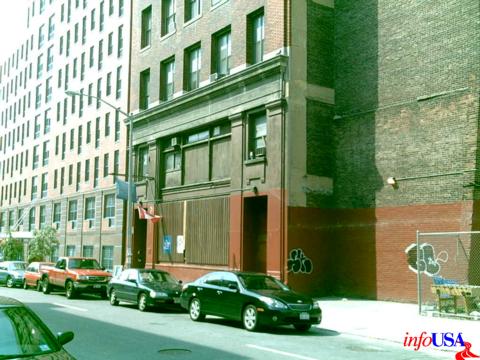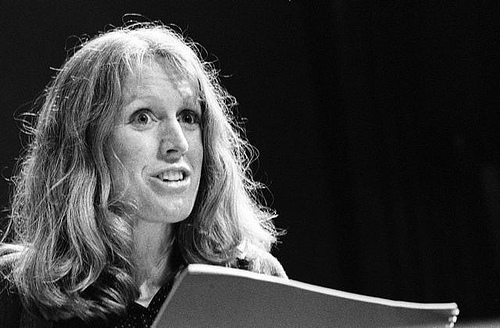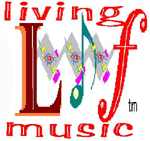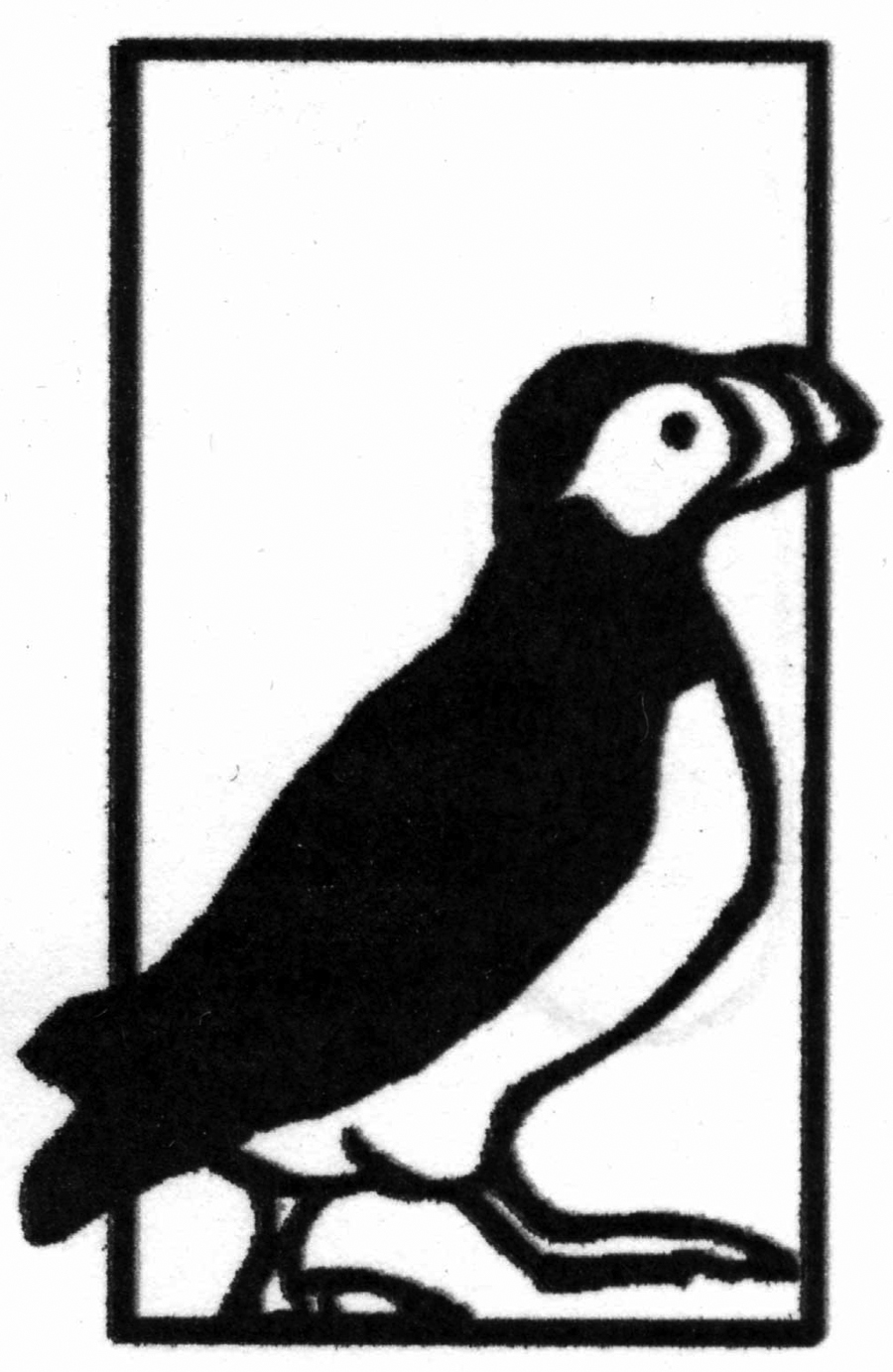| Composer's Voice Concert | ![[ Vox Novus - the new voice for contemporary music ]](http://www.voxnovus.com/img/Vox_Novus_Logo_black.png) |
| Featuring Beth Griffith | |
| May 2, 2004 | |
| Medicine Show Theatre 549 West 52nd Street New York, New York 10019 |
 |
The Medicine Show Theatre in collaboration with Vox Novus is presenting a Composer's Voice concert performing the works of Benjamin Broening, Brad Garton, and John McGuire. |
| The concert will feature the works of Benjamin Broening's Summer is late, for voice and tape, Brad Garton's Good News for voice, A Cappella for voice and tape by John McGuire, and an encore performance Noah Creshevsky's Psalmus XXIII for voice and tape. Beth Griffith will be the soprano performing. | |
| Title | Composers | Performers |
| Good News | Brad Garton | Beth Griffith – voice electronic playback and live computer modulation |
| Psalmus XXII | Noah Creshevsky | Beth Griffith - soprano electronic playback - vocal samples by Beth Griffith |
| Jubilate | Noah Creshevsky | Beth Griffith - soprano electronic playback - vocal samples by Thomas Buckner |
| Summer is late text by Stanley Kunitz | Benjamin Broening | Beth Griffith - voice and tape |
| A Cappella | John McGuire | Beth Griffith - voice and tape |
| Performers | |
 |
“An extraordinary American soprano, Beth Griffith sang with a focus and presence (as she did everything) that held a listener at rapt attention. Griffith, a Texan, recently returned to the United States after a 20-year career in Germany. It is our good fortune”
--Mark Swed Los Angeles Times
“A real highlight of the festival was the exceptional singer Beth Griffith... Her vocal artistry surpasses the conventional with an incredibly wide gamut of tonal and expressive articulation... All this seems to happen in a kind of mystical atmosphere brought about by the unique performance of Beth Griffith, as singer and as human being.” --Suzana Martinakova Literarny Tyzdennik Bratislava: “The piece that turned me to jelly, though, was A cappella, by John McGuire, recently resident in New York after decades in Cologne. With impassioned expressiveness, soprano Beth Griffith sang syncopated vowel sounds over a sparkling electronic background, medieval but vibrant in its contrapuntal austerity.” --Kyle Gann The Village Voice Since her European debut in Mauricio Kagel’s solo theater piece Phonophonie in 1978, the demand for Beth Griffth as soloist has taken her to such important music festivals as the Warsaw Autumn, Cologne Triennale, Wien Modern, Numus Festival, RIAC, Donaueschingen Musiktage, Darmstadt Summer Courses,Wittener Tage fur Neue Kammermusik, ISCM and New Music America. In addition, her acclaimed performance of Morton Feldman’s Three Voices has been heard on numerous stages from Prague, Berlin, London, New York and in between. Recent invitations led her to Grahamstown, South Africa, Gent, s-Hertogenbosch, Cologne, Wiesbaden, Raleigh, North Carolina and here in New York with repertoire ranging from chamber works by Sorrell Hays, Dieter Schnebel, Wolfgang von Schweinitz, Manos Tsangaris, solo works by John Cage, Alvin Curran, Morton Feldman, Noah Creshevsky, John McGuire, Mattricio Kagel and Rodney Waschka. |
| Composers | |
| Benjamin Broening's compositions have been widely performed and broadcast across the United States and in Europe and Asia. He has written works for many media, including orchestral, choral, chamber and electroacoustic music. Recent pieces include a work for clarinet and piano commissioned by the Band and Orchestral Division of Yamaha Corporation of America for Arthur Campbell, a work for clarinet and electronics for F. Gerard Errante and a choral /orchestral work for the Connecticut Choral Society and the Grace Choral Society of Brooklyn. Other recent commissions include a cantata for the Charlotte Symphony and the Oratorio Singers of Charlotte, a clarinet concerto for the Interlochen Arts Academy Wind Ensemble, a multi-media cantata for Hampton-Sydney College, chamber works for the Virginia Glee Club, an orchestral piece for the Riccioti Ensemble (Netherlands), music for theater and dance, as well as numerous solo works for performers around the country. A recipient of the Presser Music Award, Broening has also received recognition and awards from the American Composers Forum, from the Norfolk and Bowdoin Chamber music festivals, as well as from Yale, Christs College, Cambridge, University of Michigan and the University of Richmond. His music has been recorded on the Centaur, Equilibrium and CMJ labels. Three more pieces will be released on the Centaur and SEAMUS labels in 2004. Broining is Assistant Professor of Music and Director of the Computer Music Studios at the University of Richmond. He holds degrees from the University on Michigan, Cambridge University, Yale University, and Wesleyan University. | |
| Trained in composition by Nadia Boulanger in Paris and Luciano Berio at Juilliard, Noah Creshevsky (b. 1945) is the former director of the Center for Computer Music and Professor Emeritus at Brooklyn College of the City University of New York. His musical vocabulary consists largely of familiar bits of words, songs, and instrumental music that are edited but rarely subjected to electronic processing. The result is a music that obscures the boundaries of real and imaginary ensembles though the fusion of opposites: music and noise, comprehensible and incomprehensible vocal sources, human and superhuman vocal and instrumental capacities. | |
| Brad Garton (b. 1957) received his BS in pharmacology from Purdue University, where he also worked towards an MS in psychoacoustics. He eventually entered the graduate music composition program at Princeton University (studying primarily with Paul Lansky and J. K. Randall), where he was awarded PhD in music composition. He is currently a professor on the faculty of Columbia University, where he also serves as Director of the Computer Music Center. He is an active composer and music software developer, and has worked as consultant on the design and installation of computer music facilities throughout the world. | |
| John McGuire was born in Artesia, California in 1942. He began piano lessons at the age of 8 and French horn at 12. He began composing in college at 17. His principal composition teachers in California were Robert Gross at Occidental College, 1960 to 1964, Ingolf Dahl at the University of Southern California, Seymour Shifrin at the University of California, Berkeley, from 1964 to 1966, and Karl Kohn. In 1966-68 two consecutive Alfred E. Hertz traveling scholarships allowed him to begin an extended stay in Europe where he became directly acquainted with the music and thought of the European avant-garde. He studied counterpoint, instrumentation and composition with Krszysztof Penderecki at the Folkwang-Schule in Essen for two years, attended the International Summer Courses in Darmstadt in 1966 and participated in the Composition Studios of Karlheinz Stockhausen in Darmstadt in 1967 and 1968 on scholarship from the state of Northrhine-Westfalia. In 1970-71 he attended lectures in electronic and algorithmic composition at the Institute of Sonology in Utrecht. His music has been performed at the International Gaudeamus Music Week, 1971 (awarded first prize), the ISCM festivals in Paris, Amsterdam and Aarhus, the Darmstadt Summer Courses, Festival Musica in Strasbourg, the ICA London, the International Computer Music Conference, the Cologne Triennial, the West German Radio's Musik der Zeit (six times), the Zagreb Biennial, Festival d'Automne, Paris, the Logos Foundation, Gent, the Holland Festival, Klang-Aktionen, Munich, Pro Musica Nova, Bremen and the Bochum Planetarium; it was the focal point of the Winter Music in Karlsruhe in 1985, the Minimalisms Festival of the Berliner Gesellschaft für Neue Musik in 1998 and the Ussachevsky Memorial Festival of Electronic Music, 2000, at Pomona College. | |
Program Notes: |
|
Good News was written for the 2004 North Carolina Computer MusicFestival, organized by Rodney Waschka. The theme of the Festival was "music and text", and as I discussed with Rodney what to do he described a fun science-fiction book written by one of his friends. He sent me a copy of the book -- "Good News from Outer Space" by John Kessel -- and I very much enjoyed the sense of alienation/disconnection that forms a large part of the story. After Rodney told me that the wonderful soprano Beth Griffith would be participating in the Festival, I decided to use an excerpt from Kessel's book that seemed particularly resonant to me: "A blustery wind buffeted George's face, bringing tears to is eyes. There was weather after death. Or maybe it was life. Richard unlocked the Mercedes and held the door open for him. Lucy sat with George in the back seat and Richard drove. When they stopped at the booth at the end of the lot, George watched the young blond woman punch their ticket; he heard the time clock stutter out the printing on the back of the card. The girl had her hair pulled back in a pony tail; she gave Richard his change, but her "thank you" was drowned out by the roar of a tractor trailer from beyond the chain-link fence. They pulled out of St. Anthony's lot and into the imitation world." The soundscape of the piece roughly follows the time-trajectory of Kessel's book -- I start by transforming Beth's voice from the beginnings of a springtime swamp to a full-blown summer insect symphony. This gradually becomes a solitary winter chord, with a hint of an (alienated) spring recurring at the end of the piece. Psalmus XXIII, using the vocal samples of Beth Griffith and Jubilate, using the vocal samples of Thomas Buckner, are both written in Creshevsky’s aesthetic, Hyperrealism. Hyperrealism is an electroacoustic musical language constructed from sounds that are found in our shared environment ("realism"), handled in ways that are somehow exaggerated or excessive ("hyper"). Summer is Late Touch Me - Stanley Kunitz Summer is late, my heart. Words plucked out of the air some forty years ago when I was wild with love and torn almost in two scatter like leaves this night of whistling wind and rain. It is my heart that's late, it is my song that's flown. Outdoors all afternoon under a gunmetal sky staking my garden down, I kneeled to the crickets trilling underfoot as if about to burst from their crusty shells; and like a child again marveled to hear so clear and brave a music pour from such a small machine. What makes the engine go? Desire, desire, desire. The longing for the dance stirs in the buried life. One season only, and it's done. So let the battered old willow thrash against the windowpanes and the house timbers creak. Darling, do you remember the man you married? Touch me, remind me who I am. A Cappella was commissioned by the West German Radio, Cologne, and realized in the Studio for Electronic Music at the radio from 1995 to 1997. It was written for and first performed by Beth Griffith at the Cologne Triennale in July, 1997. The production of A Cappella was begun in January 1995 in the Studio for Electronic Music, West German Radio, with a series of digital recordings ("samples") of single tones sung by the soprano Beth Griffith. Each tone was recorded three times, for each of three vowels e, ah and u. The recordings were combined into three digital "instruments", each with its own vowel color and with a range identical to that of the singer. Sets of sounds were taken from this material and woven into strands of changing vowel colors. The strands were then overlaid and synchronized to form the polyphonic sequences of two artificial choruses. In performance the sequences are played back over loudspeakers and mixed with the live voice of the singer. The relationship of the soloist to her own playback or "choruses" takes the form of a series of calls and responses in which the soloist exchanges first with one chorus, then with the other, in alternation. During an exchange between the soloist and one of the choruses the other chorus continues a rhythmic process initiated by the soloist in the previous exchange, and vice-versa. The two choruses are different and variable with respect to speed, register and position. One chorus is by turns either faster or slower, higher or lower than the other chorus, and moving away from or toward the soloist. The soloist's role is chameleonic, taking on the characteristics of whichever chorus she is exchanging with: high and fast, high and slow, low and fast, low and slow, while acting as a point of orientation for the choruses? motion. The chorus exchanging with the singer is closer to her than the other chorus; when the choruses switch roles they also switch positions, passing through one another in space over harmonic bridges. To this extent the music is choreographed. |
|
The mission of Vox Novus is to promote contemporary composers and their music Vox Novus believes strongly in the intrinsic value of contemporary music, recognizing it as a force in the advancement of culture and art. We help keep it alive through the promotion and dissemination of the music of contemporary composers. Our goal is to broaden the channels of new music between composer and public, providing greater exposure to new music. New music has always been stigmatized, yet all musical masterpieces at one time were considered new music. Vox Novus understands that without the creation of challenging, contemporary music there will be no future masterpieces to reflect our time. Exciting new works of art are coming forth constantly, and must be heard in order for the cycle of creativity to be complete. Vox Novus gets the music heard: in concerts, over the radio, on CD’s, and on the Internet. While throughout the ages artists have struggled to create their art, one may argue that artists have never been more precarious than they are now. Today’s economic climate is competitive, and emerging composers inevitably act as their own writer, producer, publicist, agent, and sometimes performer. This is a daunting array of tasks, one that unfortunately crushes the attempts of many composers who are simply not adjusted to the present environment. Vox Novus empowers the composer to promote, expand, and advance their career. Perceiving that the most important corollary to a completed work is a performance, Vox Novus generates concerts. In these concerts we develop audiences that include yet extend beyond the bounds of the musical community, broadening the audience base by familiarizing it with certain works in repeat performances, while continuously integrating new composers into the repertoire. Vox Novus helps to fill the many roles required to promote and produce contemporary music while simultaneously teaching composers how to do it themselves. We accomplish this by providing the composer with a web page, putting on Composer’s Voice concerts, and encouraging composers to create and foster audiences. Vox Novus publicizes concerts with e-mail announcements, postings on the web, mailings, flyers and word of mouth communication. At our Composer’s Voice concerts, we encourage communication and feedback through formatted discussion between composer and audience, and also through commentary cards. This provides the composer with important insight into their work and gives the audience a feeling of power and a relation to contemporary music. Vox Novus takes a creative approach to the problem of joining the audience and composer of electronic music. This is the 60x60 project, an annual concert event featuring 60 seconds of electronic music by 60 different composers, creating a CD as the material and product of the concert. In this way composers gain a maximum degree of exposure while audiences enjoy a highly interesting and palatable product. The project was inaugurated in 2003. In the future Vox Novus aims to incorporate visual artists, thereby making this a multi-media event and broadening the audience base by cross-pollinating with other artistic mediums. The Website is another important vehicle in the promotion of contemporary music. Since 2000, our website had provided over 100 composers and musicians with a place on the web, a vital tool of survival in the modern day. This allows composers and musicians to post their bios, list of works including bandwidth for listening and down-loading, availability, publish scores, and advertise their up-coming Vox Novus concerts. With our website attracting over 300 visitors a day, our Composer’s Voice concerts running throughout the concert seasons, and our annual electronic concert, 60x60, gaining increasing momentum, we at Vox Novus work hard to promote contemporary music. Our heart lies in the music. |
| Brought to you by | |||
 |
 |
||
| Funding by | |||
 |
|||
| Funding also provided by the Puffin Foundation, "...continuing the dialogue between art and lives of ordinary people." | |||
| Home | ||||||||||||
| Calendar | ||||||||||||
| History | ||||||||||||
| Opportunities | ||||||||||||
| Vox Novus | ||||||||||||
| Site Map | ||||||||||||
| Contact | ||||||||||||
| Hosted by Malted/Media and Kalvos & Damian's New Music Bazaar | ||||||||||||
![[ Vox Novus - the new voice for contemporary music ]](http://www.voxnovus.com/img/Vox_Novus_Logo_black.png) | ||||||||||||
![[ Composer's Voice ]](http://www.voxnovus.com/img/Composers_Voice_Collaboration_Logo.png) | ||||||||||||